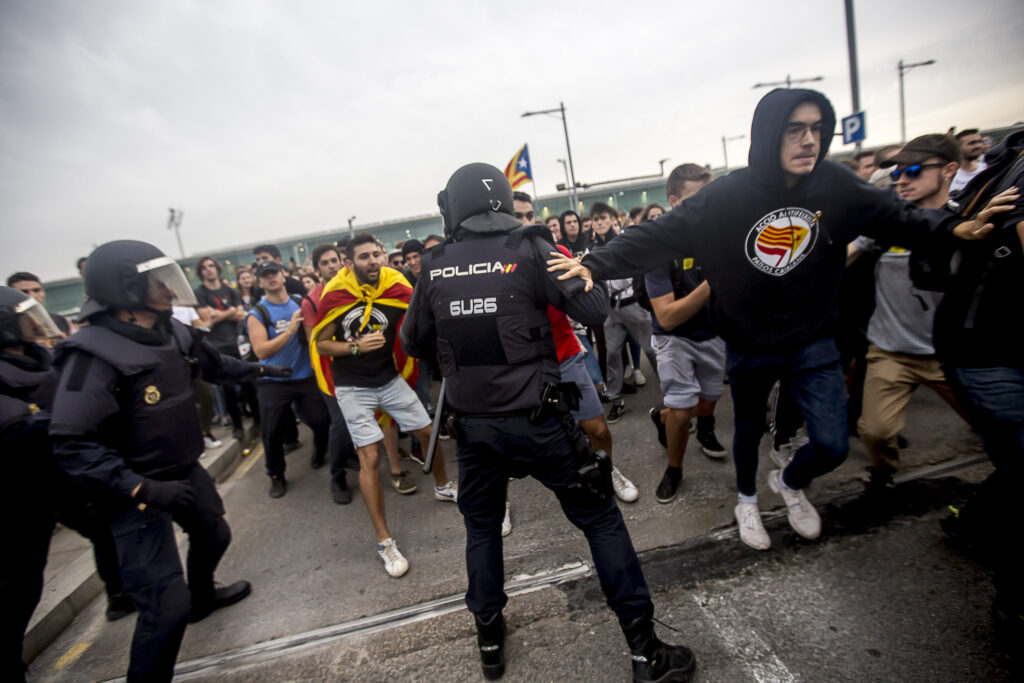06.09.2021 - 09:04
|
Actualització: 06.09.2021 - 11:04
The New York Times has recently published a confusing article which claims that Catalonia’s Tsunami Democràtic, an anonymous grassroots protest group, had links to Russia. The piece was cowritten by Michael Schwirtz, an NYT journalist known for his work on Soviet espionage, and José Bautista, the director of journalistic research at the Spanish organization Por Causa.
The article’s subheading states the following: “Intelligence files suggest an aide to a top Catalan separatist sought help from Russia in the struggle to break with Spain. A fierce new protest group emerged shortly afterward.” Although it doesn’t clarify which “intelligence files” it is referring to, the “aide” is Josep Lluís Alay, the head of President Puigdemont’s office, and the “new group” is the Tsunami Democràtic.
The article goes on to describe Alay’s trip to Moscow, where he met with Russian officials and “the grandson of a famous KGB spymaster.” When queried about the visit, Alay declares that it was part of his regular duties and that any suggestion that he went there to seek Russian assistance is simply “a fantasy story created by Madrid.”
In spite of Alay’s denial, the article outlines attempts by Russia to interfere in European politics in the past and goes on to say that “whether Mr. Alay knew it or not”, some of the officials he met are part of what US intelligence refers to as “hybrid warfare” —an alleged attempt to meddle in European and American affairs, largely by means of propaganda and disinformation campaigns.
The article confusingly goes on to state that “it is unclear what help, if any, the Kremlin has provided to the Catalan separatists.”
Nevertheless, having stated that there is no apparent evidence, the article goes on to suggest that the Democratic Tsunami was born as a direct result of Alay’s trip. Nowhere in the piece do the NYT writers mention the jail sentences handed down to the Catalan leaders as being the real cause behind the movement’s actions. It is as if the Tsunami had appeared out of nowhere, coming into existence in order to serve Russian interests. To support this version of events, Schwirtz and Bautista claim that Spain’s Guardia Civil suspect Alay of having links to the Tsunami.
The article goes on to say that its claims are based on a “secret 700-page transcript”, which one can only assume is in the hands of the Guardia Civil, although it is not made clear, which contains conversations between Alay and several individuals concerning Russia.
Dredging up previously discredited stories
In an astonishing mishmash of information, the article dredges up previously discredited stories in an attempt to prop up its version of events. One such is the existence of a specialized Russian military intelligence organisation called Unit 29155. It has been known for some time that this is pure fantasy. I myself have debunked it (see: “A (really bad) movie about Catalonia and Russian spies ”[in Catalan]). The unit, which the NYT claims is secret, is actually listed in the phone book and will answer calls.
Returning to the confusion which underlies the article, having insinuated that Unit 29155 might have had something to do with the events which took place in Catalonia, Schwirtz and Bautista acknowledge that, “Spain has provided no evidence” that it played an active role in the protests.
At this point the article names the sources on which it is based. “To piece together the contacts with Russia, The NYT has drawn on the 10-page European intelligence report, the substance of which was confirmed by two Spanish officials; case files from two separate confidential investigations by magistrates in Barcelona and Madrid, which include the transcript of the texts, but have not yielded any charges related to the Moscow meetings; and interviews with pro-independence politicians and activists in Catalonia, as well as security officials in Spain and abroad.”
Following a lead which has been discredited by the Spanish prosecutor
Only the other day, a public prosecutor —once again— rejected moves by the judge in the Vólkhov case, Joaquín Aguirre, who heads Barcelona’s court number 1, turning down an attempt to transfer part of the case against pro-independence leaders and Democratic Tsunami activists to Madrid’s National Court. In his ruling, top anti-corruption prosecutor Fernando Maldonando wrote that Justice Aguirre has failed to provide any factual or legal basis to have the case moved and instructs Aguirre to justify his decision better.
In the report, to which this newspaper has had access, the prosecutor slams Justice Aguirre for taking into consideration wiretapped conversations between Josep Lluís Alay and Alexander Dmitrenko, stating that “all attempts to attribute criminal conduct to such conversations exceeds the investigative powers of any authority.”
Surprisingly enough, much of the NYT’s efforts to show that the Tsunami Democràtic has links to Russia is based on these conversations between Alay and Dmitrenko, evidence which has been dismissed by the Barcelona prosecutor’s office. Most likely, in view of the article’s content, the report which the Spanish prosecutor has rejected is one of the “two separate confidential investigations by magistrates in Barcelona and Madrid” which the NYT reporter claims to have referred to.
To add even more confusion, the NYT article goes on to reveal the fact that Josep Lluís Alay worked on the Catalan translation of Elena Vavilova’s novel A Woman Who Can Keep Secrets. Although the title of the NYT story alludes to Vavilova (“Married Kremlin Spies, a Shadowy Mission to Moscow and Unrest in Catalonia”), the article makes no attempt to explain what significance this may have. The article also mentions the fact that the popular TV series The Americans was based on the exploits of Vavilova and her husband, both of whom were sleeper KGB agents in the US.
The remainder of the article focuses on the Tsunami Democràtic. It does so without informing the reader that the movement was formed as a response to the prison sentences handed down by the Spanish Supreme Court. Instead it insinuates that the movement’s actions were a response to Russian interests. This omission is a breach of the Editor’s Code of Practice.
Curiously, however, and as final and definitive proof of the confusion underlying the article, it ends by saying that lawyer Gonzalo Boye had advised President Puigdemont to avoid making public statements which might anger the Russians, but that, “Mr. Puigdemont did not always head [sic] the advice, appearing in Brussels with the Belarusian opposition.”


